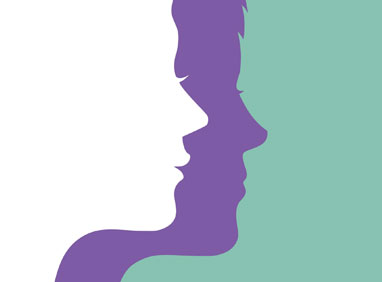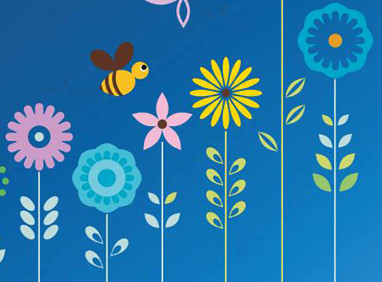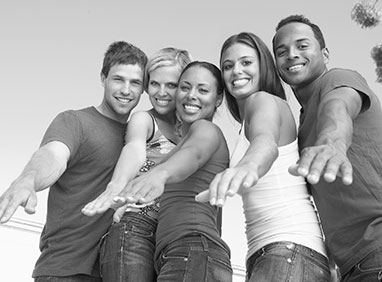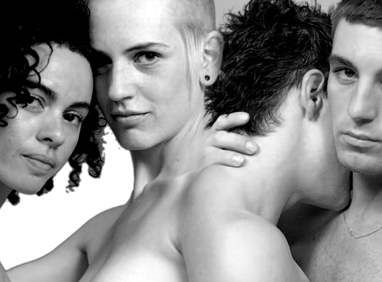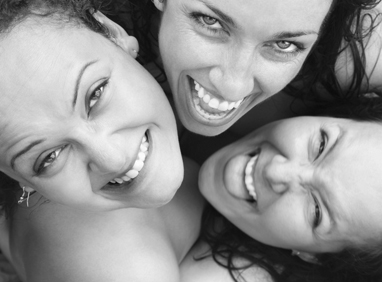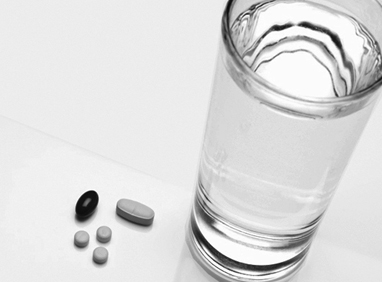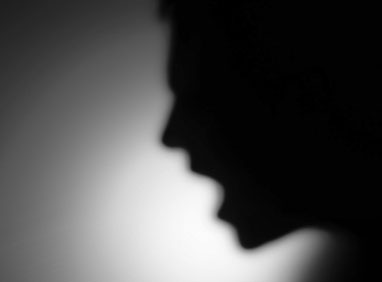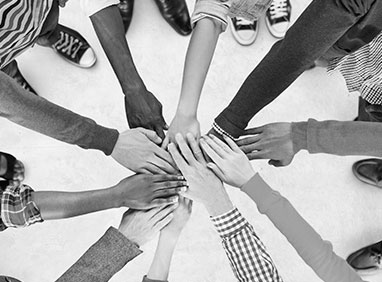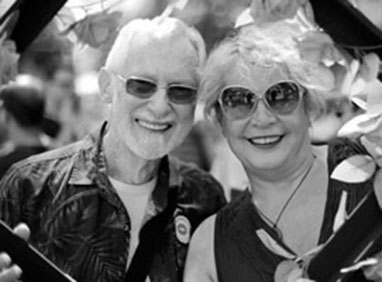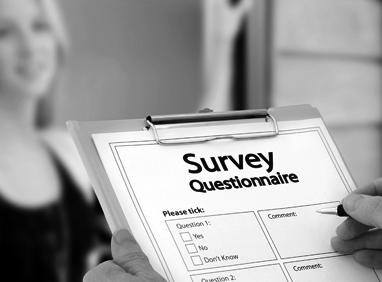Women’s Health
We’re here to help women take control of their health by providing information, workshops, a range of support services and distributing safe sex packs throughout NSW to lesbian, same-sex attracted, transgender and intersex women, and gender and sexually diverse people.

While the infection rates for STIs among lesbians is far lower than for gay men, lesbians and bisexual women are still at risk of STI infection. If you manage your sexual health and play it safe you can significantly reduce your risk of getting an STI, or passing it on to a sexual partner.
Getting a regular sexual health check-up is just as important as getting a regular skin cancer check or cholesterol test. The easiest way to do this is to combine a sexual health check up with a regular GP visit, with a GP you can talk to.
If you’re feeling a little unsure or nervous, visit Get Tested – it walks you through what happens at a sexual health check-up and gives other helpful information about STIs and your sexual health. You will also find links to other sites with great information about trans women’s sexual health.
Seeing a GP
There are many local doctors, counsellors and health services that provide great, holistic services to the LGBTI community:
The Australian Lesbian Medical Association (ALMA) compiles an up to date list of doctors and mental health professionals who are recommended by lesbian and bisexual women. This is a national project. There are currently around 90 doctors and mental health professionals on the list, including GPs and specialists, metropolitan and rural doctors.
Women’s Health NSW is a collective of non-government, community based women’s health and specialist centres. All centres are feminist services that provide choices for women to determine their individual health needs. The site provides a list of Women’s Health centres in NSW that you can access by calling for an appointment.
The Office on Women’s Health provides reliable health information for women, including a lesbian and bisexual health fact sheet. You can find out about health risks for same-sex attracted women, and gives you an idea of health issues you should think about discussing with your GP.
Gay and Lesbian Health Victoria (GLHV) has produced a brochure with tips and advice on how to locate a gay and lesbian friendly health service.
Lesbian and same-sex attracted women are more likely than heterosexual women to have experienced depression during their lifetime. We know that because of risk factors such as discrimination, isolation, exclusion and verbal and physical abuse we are also at a greater risk of suicide and self-harm. While there is no one size fits all solution, there are a range of effective options to support you when you need it.
ACON Counselling
ACON provide confidential fee-based short term counselling (up to 12 sessions) for LGBTI people seeking support in relation to their mental health and wellbeing. Volunteer counsellors use a solutions focussed model and a range of therapeutic approaches to better equip people to deal with life’s challenges.
Fees for this service are negotiated according to individual circumstances, and priority is given to people on low incomes or with limited options.
Appointments are available between 6pm and 7pm on Tuesdays and Thursdays.
Unfortunately this service is not suitable for:
- People assessed to have recent or current risk of suicide
- People who use violence
- People with unmanaged or unsupported mental illness or substance use
To access this service, you will need to undergo a brief assessment in person or over the phone.
For more information or to undertake a brief assessment please contact your nearest ACON office or submit an enquiry.
Our Peace Of Mind project seeks to reduce the impact of mental distress in the LGBTI community by helping people improve their understanding of mental health and their ability to help people experiencing mental health issues.
Support and Services
The Sydney Gay and Lesbian Counselling service provides free, anonymous and confidential telephone counselling, information and referral services and support groups for LGBTI people, their friends and family and the wider community throughout New South Wales (NSW) on sexuality and life issues.
QLife provides nation-wide, early intervention, peer supported telephone and web based services to support LGBTI people of all ages.
beyondblue has a long history of working in partnership with ACON and in providing support to the LGBTI community. The beyondblue 24 hour info and referral line is staffed by qualified mental health practitioners who can help you get immediate support. Call 1300 22 4636 24 hours / 7 days a week.
We provide confidential FREE short term counselling (up to 12 sessions) for LGBTI people and people with HIV seeking support in relation to their use of alcohol and other drugs.
Our counsellors work from a harm reduction approach to assist clients reach their goals to manage use, reduce or quit.
This service is offered in Sydney.
To access this service, you will need to undergo a brief assessment in person or over the phone.
For more information or to undertake a brief assessment please contact our Sydney office or submit an enquiry.
St Vincent’s S-Check at ACON
The highly successful S-Check service for people who use stimulants, run by St Vincent’s Hospital in Sydney, is partnering with ACON to provide the service from our Surry Hills premises (414 Elizabeth St) every Monday from 3pm-6pm.
This service is for people who use stimulants such as cocaine, methamphetamine or ecstasy and want to have a chat with a healthcare professional about how this might affect your health or wellbeing. S-Check isn’t a rehab service, it’s more like a visit to a GP who knows about stimulants and can give you tailored advice. It’s easy, confidential and judgement free.
To enquire about making an appointment click here
For more information visit www.scheck.com.au or contact the team at St Vincent’s on (02) 9361 8078 if Mondays aren’t convenient for you.
Our care coordinators are allied health professionals who can help clients with multiple and/or complex needs to:
- Access relevant healthcare services
- Increase their ability to manage their care and treatment
- Reduce social isolation
Needs may include:
- HIV
- Mental health
- Alcohol and/or drug use
- Housing
- Family/domestic violence
- Finances
- Legal
Care coordinators work with clients over 3 months to develop a care plan and provide support to help clients achieve their goals and meet their needs
The service is FREE and confidential.
Priority is given to people with HIV, and people at risk or affected by HIV
Our Care Coordinators work in Sydney at our office in Surry Hills as well as the Taylor Square Private Clinic and Holdsworth House Medical Practice in Darlinghurst.
We also offer a service in the Hunter and Northern Rivers regions.
To access this service, you will need to undergo a brief assessment in person or over the phone.
For more information or to undertake a brief assessment please contact our Sydney, Hunter or Northern Rivers offices or submit an enquiry.
Homophobic, Transphobic, Domestic & Family Violence
We’re here to help if you have experienced homophobic violence, transphobic violence, or domestic and family violence. In addition to providing counselling services, we can help you make a report to the police if you wish. Visit ACON’s Safety & Inclusion page to access information, support services and counselling.
Another Closet is an online resource developed by ACON for LGBTI people who are or may be experiencing domestic or family violence. It contains information on what domestic violence is, what to do if you are experiencing abuse, tips for making a crisis plan and the details for some referral services in NSW. It also has information for people supporting an LGBTI friend or family member who is experiencing abuse.
Bring Violence Out of the Closet is a print resource was produced by the NSW Police to assist the LGBTI community to report domestic and family violence. It provides an outline of what to expect when you make a report to the police, clarifies key roles and offers details of referrals for additional support.
If you feel uncomfortable or nervous about speaking to the Police, it might help to speak to a Gay and Lesbian Liaison Officer (GLLO). If your station doesn’t have a GLLO, you can ask for one to contact you after you have reported the crime.
The LGBTI Domestic Violence Toolkit is a resource for agencies and service providers supporting LGBTI victims of domestic violence and their families.
Empowering lesbian, gay, bisexual, transgender and intersex people to lead healthy, active and more social lives.
The LOVE project (Living Older Visibly & Engaged) is an ACON initiative that’s all about creating better conversations and improved social engagement with our older LGBTI community embers. The project aims to reduce discrimination by providing LGBTI training and support to aged care services.
On the LOVE Project site you will find a range of helpful information around aging including a series of healthy ageing fact sheets on topics like: Depression and Anxiety, Alcohol and Prescription Drugs, Fitness and Exercise, Nutrition, Social Connections, Dementia and Legal Tips.
And, a list of specialised resources aimed at assisting with some of the issues across the ‘ageing spectrum’. such as: Medicare, Immigration, Welfare Rights and Law Access.
The Community Visitor Scheme is all about reducing social isolation of older LGBTI people by providing company and friendship of Volunteer Visitors. Our trained volunteers make regular one on one home visits where they chat over a cuppa, listen to music, watch a movie or participate in a hobby, game or other activity. To get involved as a client, volunteer or service provider please contact us: (02) 9206 2028 or email: communityvisitor@acon.org.au
Aboriginal & Torres Strait Islander Women
ACON Women’s Health is here for all women.
ACON also has a dedicated project for Aboriginal and Torres Strait Islander people who are:
- Living with HIV
- Gay or bisexual men
- Lesbian or same sex attracted women
- Sistergirls & brotherboys
- Intersex
Contact us: Aboriginal@acon.org.au
(02) 9206 2000
Facebook: www.facebook.com/AboriginalProjectACON
The Women’s Coming Out Group is a free, confidential social support group, a safe and friendly place for women who are same-sex attracted, lesbian, gay, bi, queer, questioning or unsure, to meet and talk about various topics around sexuality and other life issues. It is facilitated by trained volunteers of Twenty10 incorporating the Gay and Lesbian Counselling service NSW. Head to the website to find out what happens in a group and to see the list of discussion topics for 2015 groups.
The Australian Lesbian Medical Associations (ALMA) DocLIST website features an extensive list of information and resources to help lesbian, bi and queer women connect with their community and get information on health, legal and human rights issues.
On the list you will find over 600 national and state-based organisations, groups and services and resources. Examples include community events, health services, counselling and support services, social groups, sporting groups, artistic organisations, and young people’s groups.
Lesbian, Bisexual And Queer (LBQ) Women’s Tobacco Reduction Project
Tobacco smoking is one of the biggest public health burdens today and remains the single most preventable cause of death and disease. Despite Australia having one of the lowest smoking rates in the world, lesbian bisexual and queer (LBQ) women continue to smoke at rates double the general population. The Sydney Women and Sexual Health (SWASH) study has been surveying women in contact with Sydney’s LGBTI communities every two years since 1996. Across the last eight years of the survey, smoking rates of LBQ women have remained consistently high. In the 2014 survey: 29.9% were current smokers, more than twice the rate of women in the general population; 19% were daily smokers (Mooney-Somers et. al. 2015, p. 27), versus 12% of women in the general population (AIHW 2013).
To address smoking among LBQ women, ACON applied for, and received, funding from NSW Cancer Institute to research, develop and implement a social marketing tobacco intervention tailored for LBQ women. Our research conducted last year, in collaboration with University of Sydney, explored the experiences and perspectives of LBQ women in relation to their smoking. Based on our research findings, we are currently developing an exciting new tobacco reduction campaign aimed at LBQ and other sexually diverse women to raise awareness of the high smoking prevalence in this community and to promote meaningful and relevant support strategies to assist women who have recently quit smoking or are contemplating quitting.
This innovative and ground-breaking campaign is due for release in late April 2016. Stay tuned!
Want To Know More?
If you want to know more about the LBQ Women’s Tobacco Reduction Project, our research or would like more information or support around quitting smoking, please contact shaidar@acon.org.au
ACON 2013-2018 Smoking Health Outcome Strategy
SWASH – The Sydney Women and Sexual Health Survey
The Sydney Women and Sexual Health (SWASH) survey was first carried out in 1996. It was initiated by workers from two ACON projects, Women Partners of Gay and Bisexual Men and the Gay and Lesbian Injecting Drug Use Project, who were faced with a lack of empirical evidence on which to base their intervention work. Research on lesbian, bisexual and queer women’s health and wellbeing is still scarce.
SWASH is now a comprehensive survey of sexual and gender identity; community connection; smoking, alcohol and drug use; sexual health; height and weight; psychological wellbeing; experiences of anti-gay, sexual and domestic violence; parenthood intentions; preventive health behaviour; healthcare access and satisfaction; and knowledge questions on reproductive health.
The survey is run every two years by a collaboration of ACON and researchers at the University of New South Wales (until 2009), and now the University of Sydney (since 2010). SWASH is the longest running and only regular survey of LBQ women’s health and wellbeing in Australia (and probably the world). In 2010, the survey began running biennially in Perth: Women’s West Australian Sexual Health (WWASH).
For more information and research on women’s health in Australia, visit The Australian Women’s Health Network’s Women’s Health Hub online library. Information is categorised under various themes including a section relating to sexually and gender diverse women.
SWASH downloads:
- SWASH 2014
- SWASH News Flash: Key findings from the 2014 SWASH Report
- SWASH 2012
- SWASH 2010
- SWASH Report Card 2010
- SWASH 2004
- SWASH 2000
- SWASH 1996/1998
Peer Reviewed Journal Articles:
Germanos, R, Deacon, R, Mooney-Somers, J. (Accepted 3/3/15) The social and cultural significance of women’s sexual identities should guide health promotion; an analysis of the Sydney Women and Sexual Health (SWASH) survey. LGBT Health.
Douglas, C, Deacon, R, Mooney-Somers. (Accepted 2/2/15) Pap smear rates among Australian community-attached lesbian and bisexual women: some good news but disparities persist. Sexual Health.
Conference Papers
Douglas, C, Deacon, R, Mooney-Somers, J (2014) Pap smear rates among Australian lesbian and bisexual women: some good news but disparities persist. Australasian Sexual Health Conference, Sydney. http://hdl.handle.net/2123/12063
Mooney-Somers J, Deacon R, Comfort J, Richters J. (2013) Urgent action needed to address smoking, drug use, sexual and mental health among young lesbian and bisexual women – data from Sydney and Perth. Youth Health, Perth.
Mooney-Somers J, Deacon R, Comfort J, Richters J. (2013) Using local evidence to inform public health priorities for lesbian and bisexual women’s sexual health. Sexual Health, Darwin. http://hdl.handle.net/2123/11980
Mooney-Somers, J, Deacon, R, Comfort J. Price K Richters J (November 2012) Using local evidence to inform public health priorities for lesbian and bisexual women’s sexual and reproductive health . Poster presented at 1st Sexual and Reproductive Health Conference, Melbourne.
Matheson, A, Ishter, T, May, S, Mooney-Somers, J &Deacon, R. Addressing health inequities for same sex attracted women in New South Wales, who use drugs. Australasian Professional Society on Alcohol and other Drugs Conference (APSAD), Hobart: November 2011. http://hdl.handle.net/2123/12040
Matheson, A, May, S, Mooney-Somers, J &Deacon, R. Addressing health inequities for same sex attracted women in New South Wales, Australia, who use drugs. International Harm Reduction Conference, Beirut: April 2011. http://hdl.handle.net/2123/12039
Clayton, S., Richters, J., May, S., & Eulate,V. (September 2008). Exploring lesbian health: Behaviours in community-connected lesbians and same-sex-attracted women in Sydney. Poster presented at Australasian Sexual Health Conference, Perth.
Richters, J., (April 2007). Researching sex between women. Invited presentation in forum on Gay and Lesbian Research Studies, 1st World Congress of Sexual Health (18th World Congress of World Association of Sexology), Sydney. Abstract S24-2 in 1st World Congress for Sexual Health, Achieving health, pleasure and respect, Sydney April 15-19, 2007: Abstract book. Boulogne Billancourt: Regimedia, p. 30.
Richters, J., Ellard, J., Prestage, G., Allan, B., Rudland, J., Pinwill, S., & Clayton, S. (July 2003). Prevention of HIV and sexually transmissible infections in sex between women: the practical and symbolic role of dental dams. Presented to AIDS Impact, Milan.
Richters, J., Ellard, J., Prestage, G., Rudland, J., Pinwill, S., & Clayton, S. (November 2002). Sex between women in contact with the gay and lesbian community: Use of dental dams. Presented to Health in Difference 4: Fourth National Lesbian, Gay, Transgender and Bisexual Health Con¬ference, Sydney.
Richters, J., Ellard, J., Prestage, G., Rudland, J., Pinwill, S., & Clayton, S. (November 2002). Sexual risk among women in contact with the gay and lesbian community: Sydney Women and Sexual Health survey 2002. Presented to Building a Lesbian Health Research Agenda Forum, ACON (AIDS Council of New South Wales) and ALMA (Australian Lesbian Medical Association), Sydney.
Richters, J., Aspin, C., Bebbington, M., & Prestage, G. (September 2001). SWASH 2000: Safe sex practices between women. Presented to Lesbian Health: Making Visible through Research, AIDS Council of NSW roundtable, Sydney.
Richters, J. (December 2000). Sexual identity, sexual practice and STD risk: Sydney Women and Sexual Health survey 1998. Presented to forum on women who have sex with women, Lesbian Health Interagency Network and AIDS Council of NSW, Sydney.
Richters, J., Bergin, S., Lubowitz, S., French, J., & Prestage, G. (July 1998). Women in contact with the gay and lesbian community: Sydney Women and Sexual Health survey 1996 and 1998. Poster presented at Bridging the Gap: 12th World AIDS Conference, Geneva. Abstract 23492 in Conference Record.
Richters, J., Bergin, S., Lubowitz, S., French, J., & Prestage, G. (October 1998). Women in contact with the gay and lesbian community: Sydney Women and Sexual Health survey 1998. Presented to Fifth HIV/AIDS and Society Conference, Sydney.
Richters, J. (June 1997). Women in contact with Sydney’s gay and lesbian community: identity, behaviour and risk. Presented to AIDS Impact: Biopsychosocial Aspects of HIV Infection 3rd International Conference, Melbourne.






